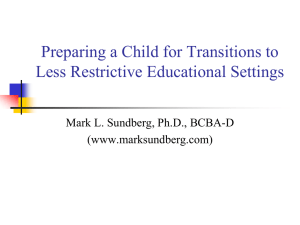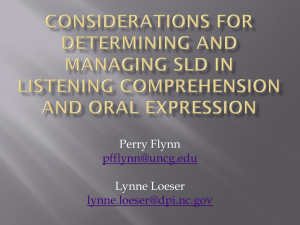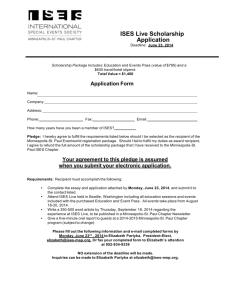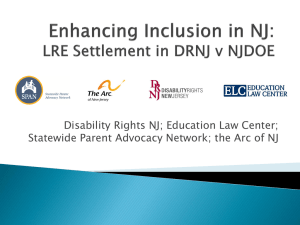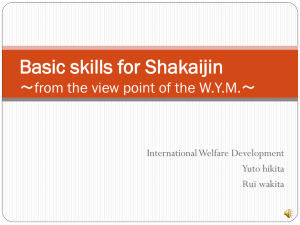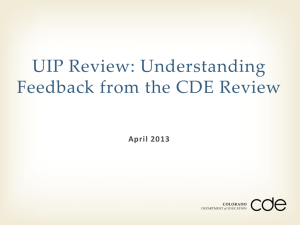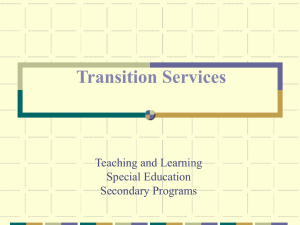A Least Restrictive Environment (LRE)
advertisement
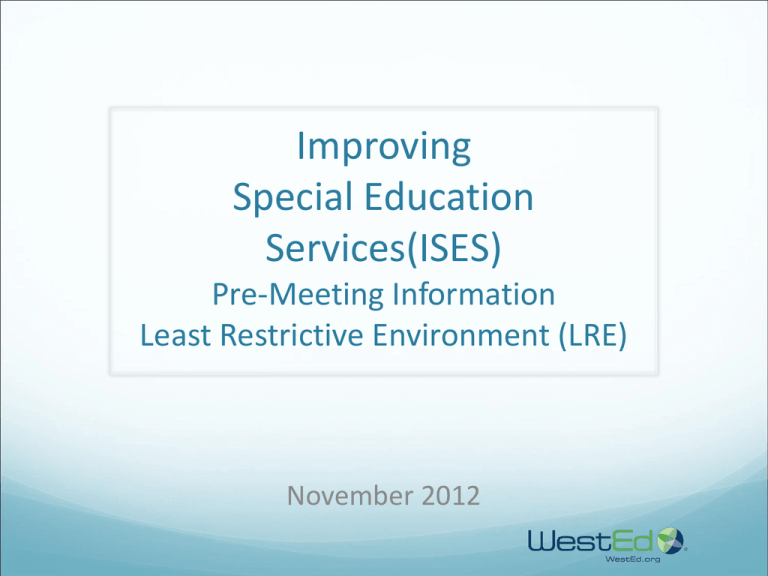
Improving Special Education Services(ISES) Pre-Meeting Information Least Restrictive Environment (LRE) November 2012 Least Restrictive Environment (LRE) Resources Project CDE Contract Administrator: Martin Miller CDE Contract Monitor: Linda Wyatt Contractor: Center for Prevention and Early Intervention (CPEI) at WestEd WestEd Project Director: Dona Meinders Improving Special Education Services(ISES) The purpose of the biannual ISES meetings are to bring California stakeholders together to review and analyze the Annual Performance Report (APR) data that informs the State Performance Plan (SPP) improvement activities. Last December CDE initiated a two-year planning process that will create more meaningful discussions of data, needs, and priorities. This process will culminate in the improvement plans for the FFY 2012 SPP and APR (due Feb 2014.) State Plan Process (SPP) The November pre-meeting and December ISES meeting will focus on tasks 1 & 2 of the process. 1. Analyze Information 2. Identify Needs and Priorities 3. Develop Improvement Plans 4. Identify Resources November ISES - Pre-Meeting The purpose of the pre-meeting is to give ISES stakeholders an opportunity to see the state LRE data and prepare for the development of needs statements that will be the focus at the December ISES meeting. Participants will learn about the activities of the LRE Resources Project with a focus on input from the June ISES meeting. With the data and information provided, ISES stakeholders will be better prepared to discuss needs and issues related to the discussion group topics. ISES Discussion Groups The purpose of the ISES discussion groups for the December meeting is to generate and evaluate needs statements in each of the of the areas in preparation for the California Department of Education (CDE) to identify priorities and prepare a detailed improvement plan for the APR and SPP due in February 2014 (FFY 2012). LRE/ISES Discussion Group Each discussion group will: 1. Provide an overview of California data including trends and national comparisons. 2. Develop needs statements for the topic. 3. Evaluate the needs statements based on a matrix that will assist the stakeholders in determining impact and likelihood of meeting the need. 4. All discussion groups must have at least one needs statement relevant to parent engagement and personnel development. Least Restrictive Environment (LRE) “The LRE provision guarantees a student’s right to be educated in the setting most like that for peers without disabilities in which the student can be successful with appropriate supports provided.” Friend & Bursuck (2011). Including Students with Special Needs IDEA Part B LRE Indicators Indicator 5: Percent of children with IEPs aged 6 through 21: Inside the regular classroom 80% or more of the day; Inside the regular classroom less than 40% of the day; Served in separate schools, residential facilities, or homebound/hospital placements. California LRE Data Indicator Percent of Students 2009–2010 2009–2010 Target Target Met 5.A. In general education 80% or more 51.4 At least 68 percent No 5.B. In general education 40% or less 22.7 No more than 14 percent No No more than 3.9 percent No 5.C. Served in separate schools or facilities 4.60 10 ISES LRE Input Targets are established for the federal mandate of the SPP Indicator 5 –Least Restrictive Environment (LRE). California has not met its LRE targets for several years. The ISES stakeholders’ group has identified LRE as a high priority area. At the December ISES meeting, the stakeholders will develop needs statements for LRE after examining the statewide LRE data. Using a rubric stakeholders will rate the needs statement on the impact and the likelihood of implementation of each needs statement. ISES Recommendations – June 2012 LRE Resources Project 1. Connect higher and lower performing districts by having higher performing districts mentor lower performing districts. 2. Post information and descriptions of successful practices on the LRE website. 3. Maintain website with rich resources. 4. Write “stories” about model sites including visitations and observations, including , options to drill down for more information and post on LRE Web site. 5. Use Focused Monitoring Technical Assistance Consultants (FMTA) to link resources to compliance. ISES Recommendations – June 2012 Future Actions LRE Resources Project 1. Share data and information at conferences to showcase – ACSA, CARS, CASP, CEC, TASH, CSESA, CSBA, Cal Council, State SELPA, PTI’s (parent groups). 2. Use List Serve and Constant Contact to communicate. 3. Share examples of effective use of student data and how to use data to track student progress. Future Actions LRE Resources Project continued 4. Post recorded webcasts/panel discussions about best practices targeted to SELPA directors, district directors, principals, assistant principals, program specialists, coordinators. 5. Produce short videos and webinars and post on website. 6. Produce a series of webinars that highlight high percentage local education agencies (LEAs). 7. Include family partnership highlights in each model site description. 14 LRE Resources Project Tasks Task 1 - Identify high and low percentage LRE Districts Task 2 - Infuse LRE into Educational Benefit Process Task 3 - Develop guidance for data collection for LRE Task 4 – Select LRE Technical Assistance Providers Task 5 – Redesign LRE Web site 15 Update on LRE Resources Project Activities Year 1 high percentage site case studies are being developed and will be posted on the LRE web site. Proposed questions which target LRE in the Educational Benefit Process and informational training slides have been developed. Descriptors of the LRE indicator data from other states have been identified and will be shared with CDE and ISES. LRE Web site redesign is in progress. Thank You ! Thank you for your participation in this pre-meeting preparation event! We will use your input today to prepare an inclusive and effective meeting of the Improving Special Education Stakeholders (ISES) in Sacramento on December 3, 2012! Lessons From Successful Districts • Inclusion and access to the core curriculum, • Collaboration between special education and general education teachers • Continuous assessment and use of leveled interventions • Targeted professional development • The use of explicit direct instruction. American Institutes for Research, Jan 2011 18
